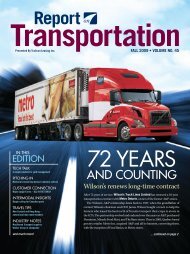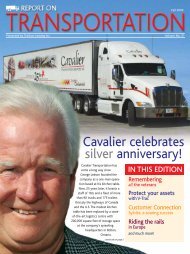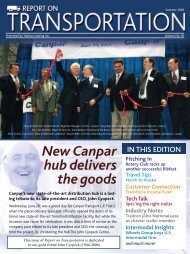Fall 2012 - Trailcon
Fall 2012 - Trailcon
Fall 2012 - Trailcon
You also want an ePaper? Increase the reach of your titles
YUMPU automatically turns print PDFs into web optimized ePapers that Google loves.
TECH TALK<br />
Trailer telematics boosts bottom line<br />
By Doug Myers, Director of Sales and Marketing, Transport Refrigeration Inc., Madison, Wisc.<br />
The use of telematics devices in our industry<br />
has dramatically changed how we interact<br />
with drivers and customers, as well as<br />
internally within our own companies. The<br />
rate of innovation in this field has been<br />
remarkable, and the data now available<br />
allows fleet operators to manage their assets<br />
more effectively than ever.<br />
The most common definition of telematics<br />
is “the long-distance transmission of<br />
computer-based information.” In the early<br />
days, satellite transmissions were the norm.<br />
Over time, we evolved into cellular technology,<br />
which has reduced the cost and increased<br />
the frequency of each transmission.<br />
When we look at the use of telematics<br />
in trailers, there are two distinct groups:<br />
refrigerated and dry. The most common<br />
form of telematics used is a simple tracking<br />
mechanism that provides GPS data such as<br />
location, speed, and a history of the trailer’s<br />
movement. This data can boost return on<br />
investment (ROI) by improving trailer utilization,<br />
identifying excessive dwell time,<br />
and finding lost or stolen trailers. Looking<br />
beyond these simple data points, there<br />
is much more information available if we<br />
increase the resolution and communicate<br />
more often. Using the cellular network, we<br />
now have that gateway.<br />
In a dry trailer, we can add devices such as<br />
door sensors, electronic locks, and tire pressure<br />
monitoring systems (TPMS) to speed<br />
When we look at the use<br />
of telematics in trailers,<br />
there are two distinct groups:<br />
refrigerated and dry.<br />
up the ROI and provide a more comprehensive<br />
tool. This requires a system that can<br />
communicate cost-effectively many times<br />
per day or whenever a significant event<br />
occurs – for example, door open/close, tire<br />
pressure high/low, or tire temperature high.<br />
Events can also be used to trigger an alert<br />
to a fleet manager that a condition exists.<br />
With proper telematics hardware, a tire<br />
condition can be identified on a drop trailer,<br />
giving the manager an opportunity to correct<br />
the issue before the trailer is under load.<br />
With a reefer trailer, the amount of data<br />
now available is even greater.<br />
Today’s refrigeration units incorporate<br />
robust electronics<br />
systems to communicate with<br />
telematics. The units actively<br />
monitor the various temperature<br />
sensors, the mode in which<br />
the unit is running, and any<br />
alarm conditions. The telematics system<br />
can utilize the reefer battery, giving us<br />
access to nearly unlimited power. Like the<br />
dry trailer, we can add the door sensors,<br />
locks, and TPMS to improve the ROI. Another<br />
useful feature is the ability to add fuellevel<br />
sensors and additional temperature<br />
sensors to cross-monitor the temperatures<br />
given from the unit microprocessor. This<br />
can be helpful when building a cold-chain<br />
compliance plan, as you have data backed<br />
up from two sources – the unit and an<br />
independent sensor.<br />
By employing today’s technology, a trailer<br />
telematics system can provide so much<br />
more than tracking information. You can<br />
incorporate the multiple data points into<br />
your operation to limit downtime, preemptively<br />
address issues before they escalate,<br />
and drive down the overall cost of each asset.<br />
6 REPORT on TRANSPORTATION






